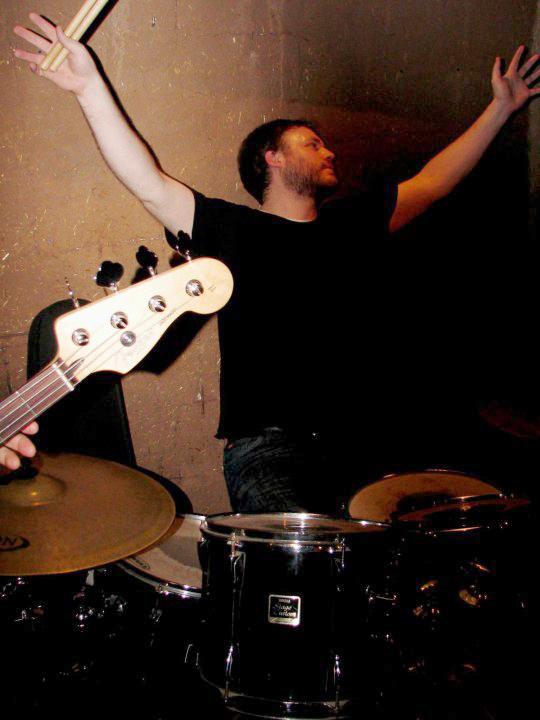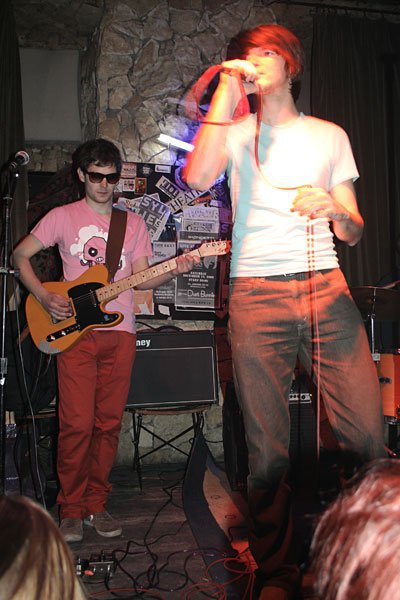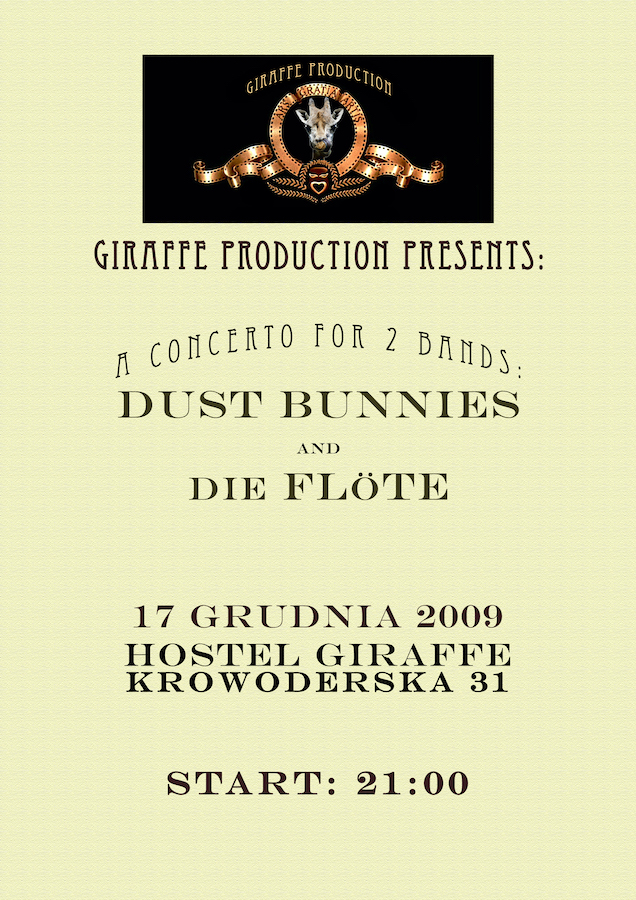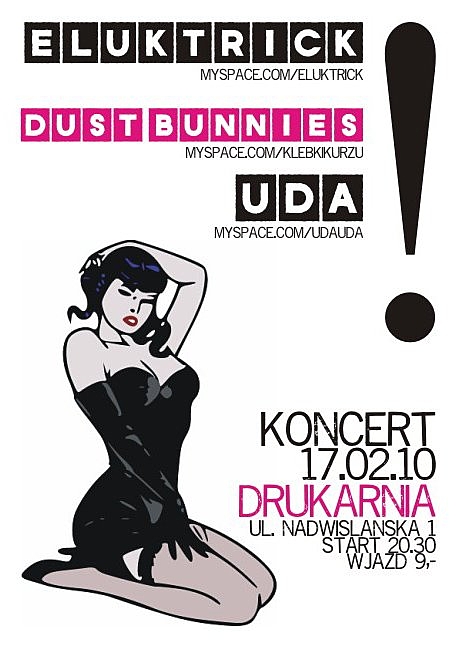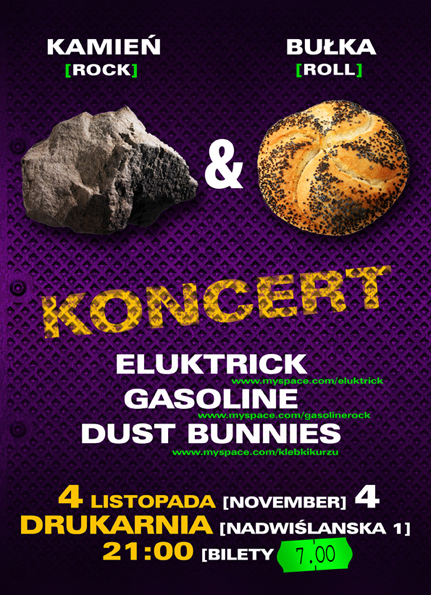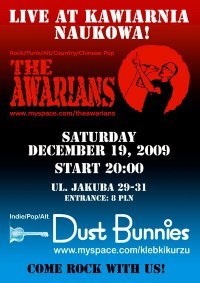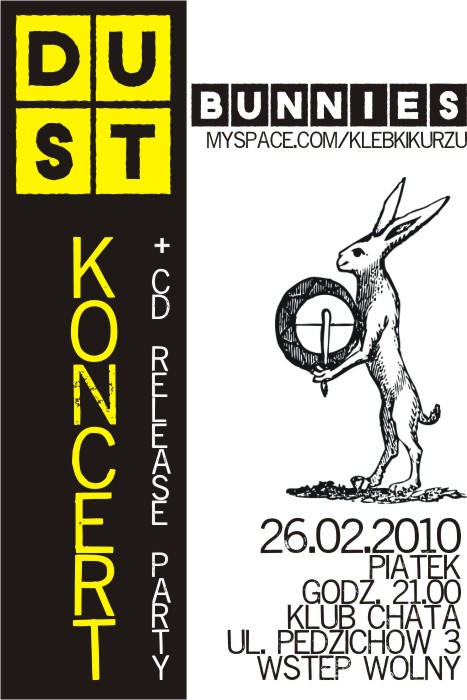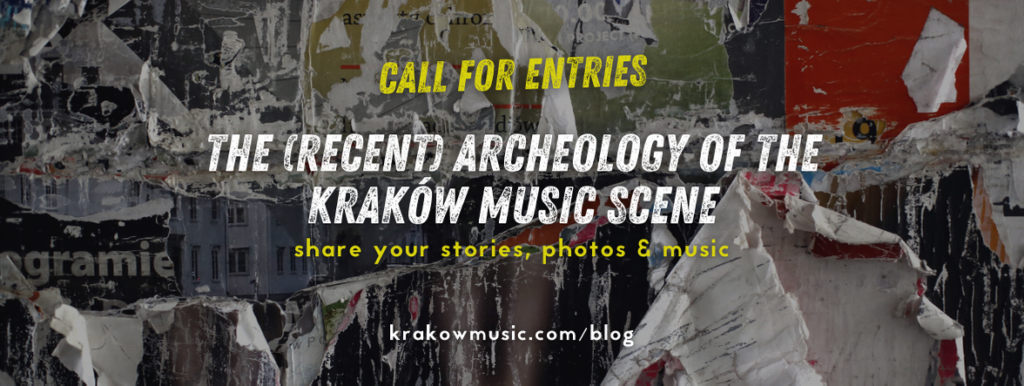My Polish musical adventure started when I arrived here in Autumn of 2006. I took a ferry with my partner from Ireland to France and drove across Europe. It was a memorable road trip, national-lampoons style, that involved a mix of camping in Ordnung Muss Sein German campsites and sleeping in the back of the Polo with the seats down – like hobos who had happened to get lucky enough to find an unlocked car. We spent the long journey across the plains of Northern Europe listening to new albums by Yo La Tengo, The Go-Betweens, My Morning Jacket, Sufjan Stevens, Gorillaz, Bright Eyes, etc. That music-induced, trance-like state was rudely shattered upon arrival at Poland’s borders. We were finally behind the Iron Curtain and on first impression the country seemed rather different; the roads were narrower than Germany’s, more pot-holed and really really busy. The locals also enjoyed frantically marauding through their pristine forests picking edible mushrooms, as was evident by the amount of cars parked by the side of woodland roads. Oh and they liked drinking their tea black – with lemon in it. This would need a period of adjustment.
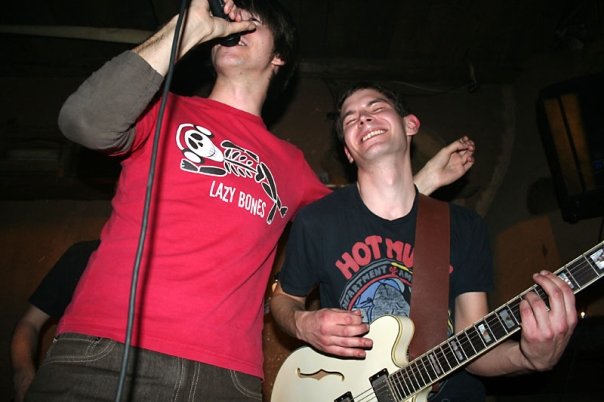
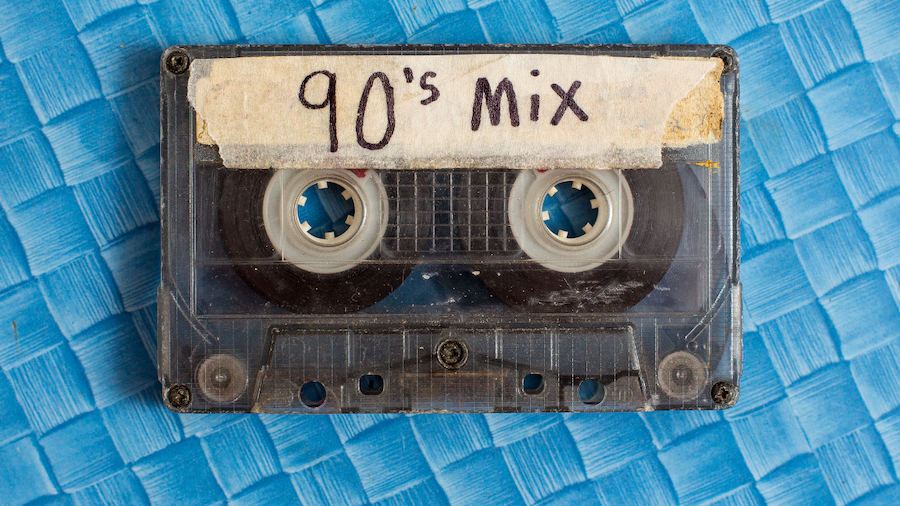
One thing seemed clear from the musical landscape that stretched out before my fresh ears: it seemed as if the 90s had never happened here.
The next months provided that opportunity. The radio played something called Disco Polo, like a plastic Polish version of Serbian Turbo Folk without the overt nationalism, or really cheesy 80s hits from Bonnie Tyler, Scorpions and Alphaville (who, it turned out, were not just big in Japan). One thing seemed clear from the musical landscape that stretched out before my fresh ears: it seemed as if the 90s had never happened here. It had been many years since I had played music and although I had picked up the bass guitar as an eager 15-year-old, life had somehow got in the way. I had neglected my hobby in the rush to have a career, relationship, etc. A chance encounter while living in Nowa Huta provided me with the opportunity I sought to rekindle a lost love.
Too Short, Too Soon: Too Pretty for Porn
It was around this time that I was introduced to the irrepressible Phil Soanes through a mutual friend. Phil, a fellow Irishman who now runs the alternative record label Resonating Wood Recordings from Slovakia, was eagerly looking to start a band in Kraków. It turned out he was a nifty enough guitarist and a decent songwriter in the troubadour tradition of Cohen, Dylan and Buckley. He’d landed a shy drummer from San Francisco who could keep time and also write songs (Nico Bailey) – a beautiful and rare combination. He had a decent voice too so we all thought he was like Krakow’s answer to Phil Collins. There was also a mad Scottish crooner called Dave Devine who looked like Billy Gillespie’s (Primal Scream) unhinged younger brother. Dave seemed hell bent on systematically dulling his vocal chords with copious amounts of cigarettes and cheap Wisniówka, priming and preening himself for singing duties while seducing the ladies with his rolling ‘R’s and ridiculously suave Polish that we were all so sickeningly jealous of. Some Poles even refused to believe he was Scottish – that’s how convincing his accent was. Anyway, we coalesced around Phil, the kingpin, and man who had brought us all together. It was great fun but like some kind of demented cult and the name – Too Pretty for Porn – was, of course, embarrassingly bad, for which I am mostly to blame. Some people even made snide remarks that we weren’t edgy enough for such a title, but that just merely egged us on. Within several months we had a few songs and things were moving. One of our songs, Myopia, written by Soanes, had an edge to it that was vaguely reminiscent of a poppy version of Interpol, but the lyrics were introspective and bristling with insecurity.
I’ve countered silence with openness at my expense
But words can hurt the hardest heart
And deconstruct a work of art
At other times it was the melancholy of the outcast, the social recluse, but one who was more than willing to use alcohol to overcome their limitations to peel away the veneer of social decorum for personal gratification at the expense of everything else – including friendships.
I wear myself without a straightjacket
If I can laugh then is there any great intent?
I give you truth you give me hell
I give you truth you give me hell
I live for every day If we are free then why regret when barriers are cast aside
And honesty is put before pride
Phil Soanes’ Rusted Sounds
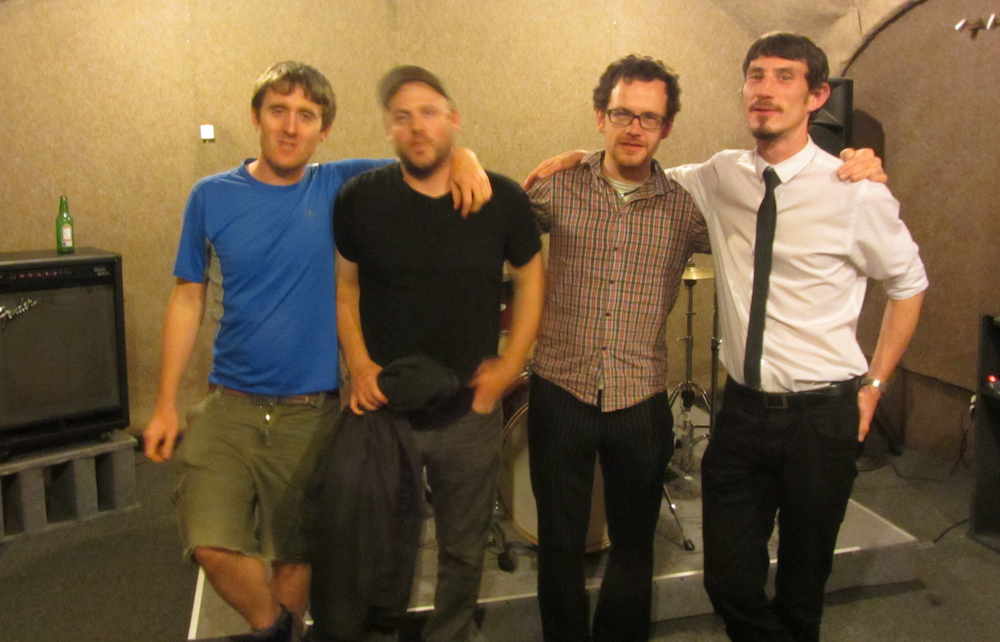
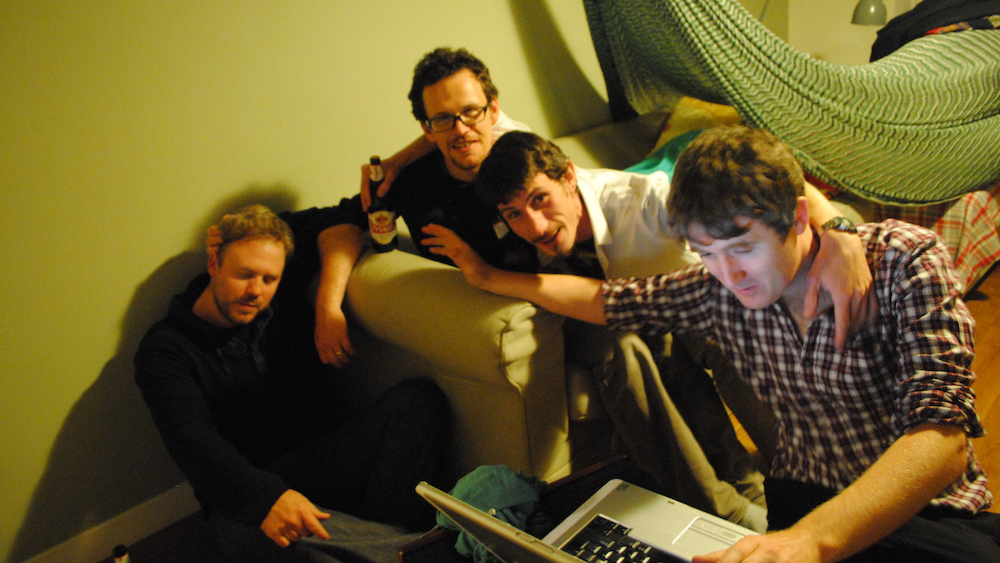
Sweeping the Kraków Underground Cellars: The Dust Bunnies
Then summer came and instead of seizing the day, we seized up like a broken rusted bicycle. We were all teachers, and some of the guys (Phil and Dave) had to leave to teach in summer schools abroad – and just when we were starting to make progress. The rhythm section had other ideas and we desperately wanted to keep playing and thought about how we could go about that. There was a palpable feeling of intense creativity ahead and we didn’t want things put on hold until Sep/Oct. That didn’t make any sense to us at the time, and, selfishly, nor did any sense of loyalty to the others.
We transformed into The Dust Bunnies when we found a fine young guitarist called Igor Herzyk from Bielsko Biała, who these days hones his guitar witchcraft with the gothic Them Pulp Criminals and who would later play with Uda and Vladimirska; An ostentatious vocalist from the US Midwest, Dominic Leppla, waited in the wings with an odd penchant for both Prince and the Replacements, agile vocal acrobatics at the ready. He eventually starting penning deft insightful lyrics after a period of sustained prodding. He explains how he found himself in the band.
How did I come to be part of the short-but-sweet-lived Krakow rock’n’roll outfit Dust Bunnies AKA Kłębki Kurzu? It was thanks to a chance meeting with an American drummer and songwriter, Nico Bailey, at the birthday party of a mutual znajomy – someone who later told me that one of our songs sounded like it should be on the Rocky Horror soundtrack (I took the compliment!). This was at the bar below Kino Kijów. I hadn’t been in Poland long, but just long enough to feel a bit out of place with the uneasy scrambling for steadier work. Many Warka Strong and Wściekły Pies were consumed that dimly-lit evening, and I didn’t think much of it till I got a phone call a week later on my Nokia from a number I didn’t recognize. I heard a West Coast drawl. ‘Heyy man, it’s Nico. So when would you like to come audition to sing with us?’ Ehh? Apparently I’d been drunkenly touting myself as a vocalist, though without much memory of it later. This story seems plagiarized from the plot of The Commitments but it’s true. While I don’t have Andrew Strong’s talent as a soul shouter, I like to think I’m a better line reader – and less of an asshole!”
Band lineups are a mystical thing. Why do some work and some fail miserably? In the best-functioning bands I’ve had the pleasure of being in, there is often this intangible and elusive quality that cannot be defined; it unites the divergent personalities and tastes present, it includes everyone in its embrace, and channels an unspoken understanding that relegates petty disputes, mocks egos and focuses on the primary motivator above all else – the music. We would spend the next few glorious months working on songs for an album that was recorded in two brutal days, with bone-shattering hangovers, in Jarek Wyka’s (from veteran Krakow outfit Smingus) Lubel Studio near Nowy Kleparz in January 2010. We played a few lively shows in Krakow during that year we were together, including the famed Drukarnia in Podgórze with another band called Eluktrick that also included Smingus keyboardist Thymn Chase and alt country outfit Gasoline.
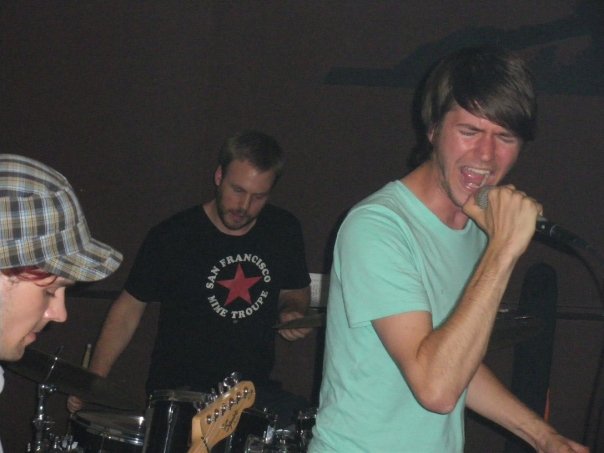
What a great time it was, and I have only positive memories apart from sparring with our prickly vocalist. I thought a little rancor in a band could be a good thing – just a little mind you. Undeniably, there was an energy and vibrancy to the scene we found ourselves in and even though our music was hardly unique or novel – a weird blend of Television, Cake, and David Byrne –surprisingly no one was really making anything like that in Krakow then, apart from perhaps Die Flóte with whom we played our first gig in a hostel on Ul. Krowoderska (everyone was dressed in Togas). People had a thirst for the hummable tunes and we were happy to quench both their needs and our own alcohol dependencies on the free beer for bands at the bar deal. The Dust Bunnies wrote melodic indie rock that resonated with a sense of dislocation, desire, despair, paranoia; at their core the songs were unapologetically steamy morsels of mindless sexual indiscretion and debauched living which some members may or not may have been partaking in. Krakow’s seedy alcohol-soaked underbelly harangued and guiltily pulsed through the lyrics of songs like Cellar Sound, which Dominic sums up as “at least one serious-minded tune, which I thought of as a critique of spending too many nights in Krakow’s basement bars, as the real world flew by, street level…”:
Pogoda barowa
But it don’t rain on you it pours.
When I ain’t around to stem the tide,
You walk home on all fours.
It used to make sense,
To write this off as a temporary bent,
But dreams get pushed so far away,
You’d need a telephoto lens
The town’s subterranean watering hole dens were a siren’s call to the weak and morally infirm.
You’re always down,
You dig that cellar sound
Underground
Which means Let’s have another round
For lead vocalist Leppla, there was a big challenge in crafting actual songs with meaningful lyrics but it spurred him on. He explains:
For me, a guy who’d been obsessed with pop his whole life, the prospect of actually writing music – I’d only ever been in cover bands – was a scary one. At first I thought everything we did was crap. This led to some initial difficulties with my bandmates, because I was the guy with only his voice for an instrument, and when I thought something was off – I’ve a decent ear – it was hard to express myself. But we muddled our way through, and I think we made some pretty alright music. Shaun and Nico, firm friends and band veterans, already played together well as a rhythm section. After a gig or two the band gelled as a whole and started to cook, driven by Igor’s nervy and nimble fretwork. He would be often seen pouring his heart out to bartenders post-gig after too many Bushmills (my fault I’m afraid). More songs were soon to surface. As the frontman, I felt it was my job to be a bit ridiculous, a comedian, as the great DC musician Ian Svenonius once put it. After all, this was rock’n’roll (RIP Little Richard!). I also found a role I enjoyed in being charged as the primary lyricist. In this, I spent much of the time mocking the cliché of rock being a front for sex, or writing faux-desperate tales of lust and longing.
These sentiments were all too evident in numbers like Is Love Enough, where the dilemmas at the heart of commitment in a world of bohemian splendor overtly wove their way through the lyrics, or was it simply an ironic take on the cliched rock and roll lifestyle?
So we push and pull, but out of the sack
Keep ourselves hid in a fusillade of this’n’that
We prove to be true what we seek to deny
Action is all and words are a lie, sayin’
Love, love, is that enough?
A weapon against, or that opiate bluff
Love, love, is that enough?
She grabs my mouth and stops me rough with
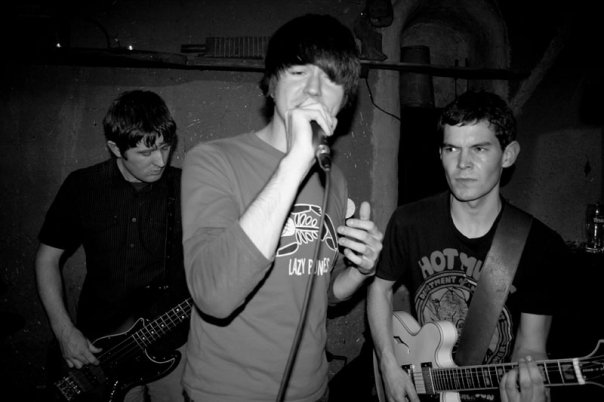
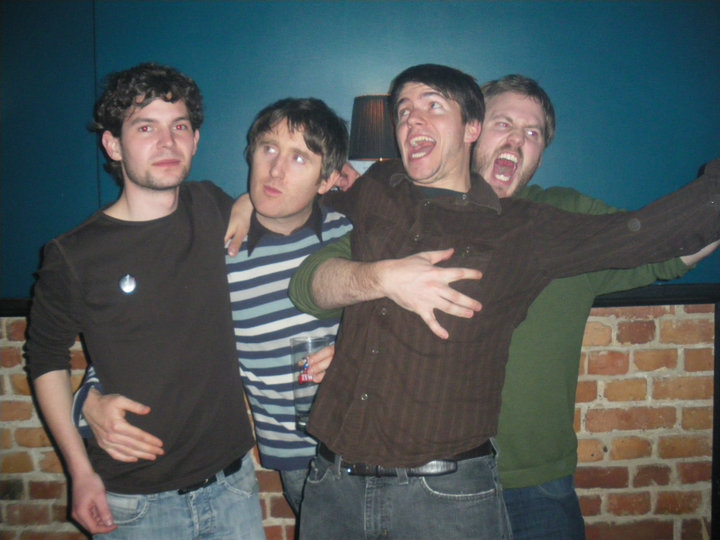
The Dust Bunnies wrote melodic indie rock that resonated with a sense of dislocation, desire, despair, paranoia; at their core the songs were unapologetically steamy morsels of mindless sexual indiscretion and debauched living which some members may or not may have been partaking in.
Live, we covered an eclectic bunch songs from the Buzzcocks to Del Shannon and Talking Heads, but our primary focus was always on our own material, the majority of it haemorrhaging from the heart of our in turns melodic and idiosyncratic Californian drummer, Nico. His intuitive playing, replete with tasteful percussive flourishes and dynamic fills perfectly expressed the songs’ essence. It was the first time I had worked with such an instinctively aware man on the sticks,
one who knew the soft and light spots of his own creations so well. For someone so young, Igor also added depth and vigour, his distinctive guitar style – bluesy and raw – worked well within the poppy soundscape we were forging. In a short period of time we had over 12 numbers. We got to play the renowned Kawiarnia Naukowa in Kazimierz with local act The Awarians, and even sold 50 copies of our debut record at a small klub on Ul. Długa.
Leppla reminisces:
The song,’Cellar Sound,’ also gave us the name of our debut record, Cautionary Tales which was mixed and mastered by Tom Carter from Krakow favourite Fox Gang. Little did we realize when we planned its record-release party, at the inviting, subterranean Chata, on Pędzichów, that this would also be our final gig – even the power cut out too, briefly! It was a hell of a fun gig to go out on. All told, I’ll always be appreciative that Krakow folks heard our music with open ears, without the ‘scenester’ inclinations I’d come to know back home in the US. Just four guys eeking out rock’n’roll together in the smelliest practice room on God’s green Earth. It was a happy time.
I understood these sentiments. Playing music in Krakow gave us a chance to break out of the straight jacket confines of our own minds, the towns we had come from, the countries we called home. Krakow was a place free from judgement where being a stranger, an outcast, a foreigner, somehow liberated us, and openly encouraged our creative bent; the city was an evil mistress at times, but she teased us with unlimited possibility. Here we could reinvent ourselves and turn our backs on the cynicism of the previous lives we had lived.
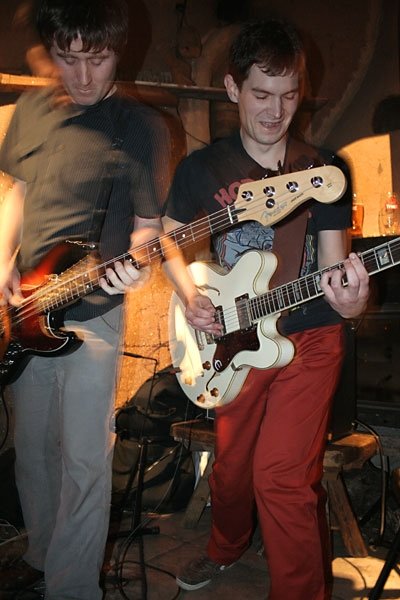
That said, our new world, inside and outside the band, was impermanent and shifting continually. The life of an English teacher by day and band member at night was neither sustainable nor healthy. It was a splendid dream at the time, but we all knew that our tenure was doomed to be short-lived. Our mental malaise fed the creativity, and that sense of transience, of imminent catastrophe, was a catalyst for our music and charged our work ethic and urgency, but the end was closer than any of us had thought; our drummer wanted to relocate back to the US and that was that – it was all over in an instant.
In retrospect, some things in our lives remain pure even through that perverse and foggy lens of nostalgia. There were resplendent moments of joy here to offer sustenance in the future – sickly sweet vodka-soaked memories, romantic misunderstandings, strong friendships, delicious pop hooks and filthy riffs – and even after their brilliant embers faded to be replaced by the dull banality of everyday life, I counted myself lucky to have experienced, however fleetingly, something like that. Everything has an expiry date, but deep down I felt like there was so much more music to make and I had just met this other American guy who wanted me to play bass in his band …
